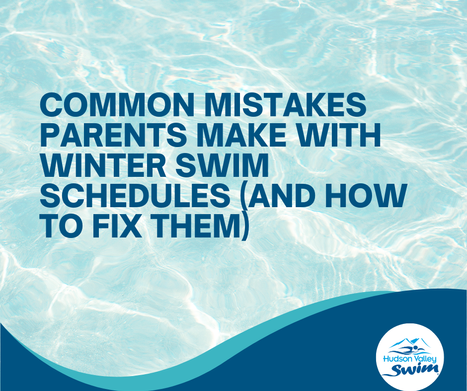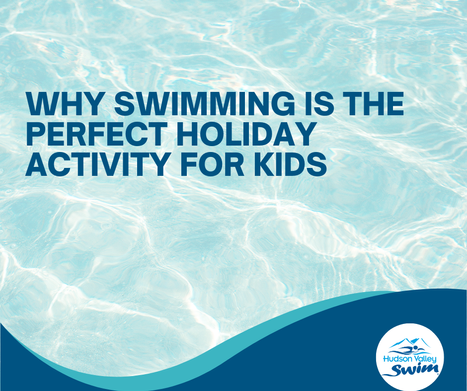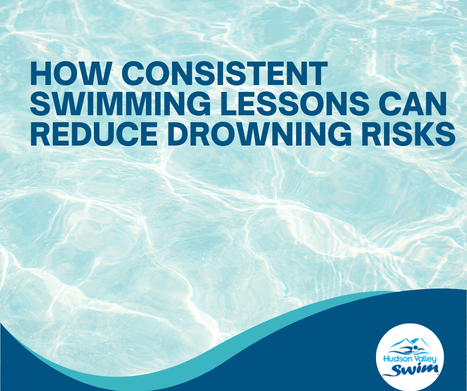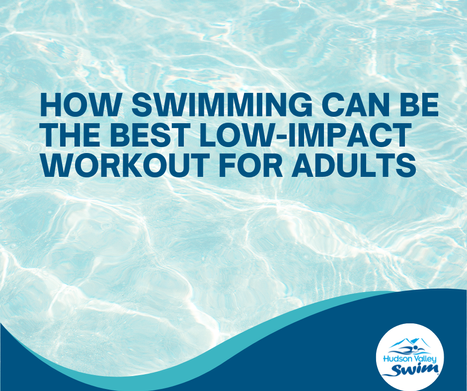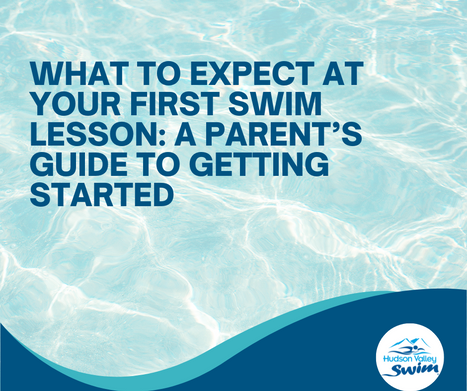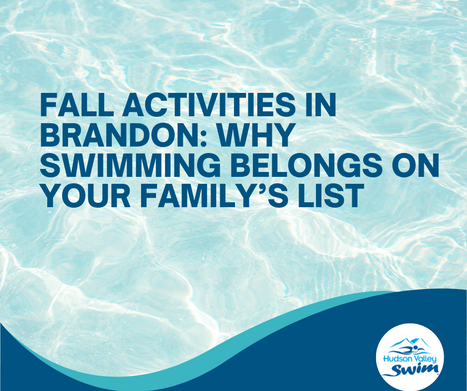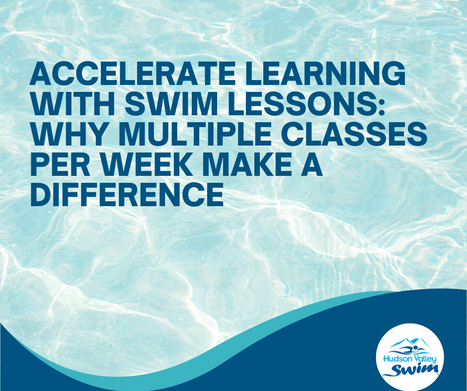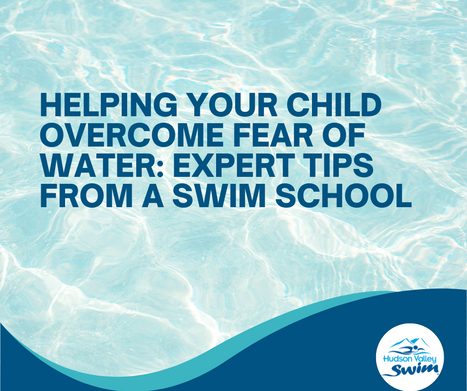Blog
Making Waves Together: Hudson Valley Swim & Every Child A Swimmer Unite for Water Safety
Water safety is more than just a skill — it's a life-saving imperative. That’s the core of what drives Hudson Valley Swim and Every Child A Swimmer (ECAS), and their partnership is making a real difference in communities across the country.
A Shared Mission: Lifesaving Through Swim Education
Hudson Valley Swim believes deeply in its motto: “Empowering Safe Swimmers For Life.” Since it was founded in 2003, the company has taught infants through adults to swim, emphasizing safety, skill, and confidence. ECAS, meanwhile, is on a parallel mission: to make swim lessons accessible for children who might not otherwise be able to afford them. Through its scholarship program, ECAS provides low- to no-cost swim lessons so that every child has the chance to learn life-saving water skills.
How the Partnership Works
Together, Hudson Valley Swim and ECAS are breaking down barriers to swim education in several powerful ways:
Scholarship Access
Hudson Valley Swim is one of the trusted swim school providers in ECAS’s network, offering scholarship-supported classes to families who qualify for ECAS’s grant program. These lessons don’t just teach swimming — they teach water safety, self-rescue, and how to be confident in and around the water.
more
Common Mistakes Parents Make with Winter Swim Schedules in Brandon, FL (and How to Fix Them)
Winter in Brandon, FL can make it challenging to keep kids active—but swimming lessons are a great solution. Even with the best intentions, many parents fall into scheduling pitfalls that slow progress or cause frustration. Knowing the common mistakes—and how to fix them—can make your child’s winter swim experience fun, consistent, and effective.
Mistake 1: Skipping Lessons Too Often
With holiday celebrations, family trips, or winter breaks, it’s easy to miss swim lessons. Skipping too many sessions can slow skill development and even reduce confidence in the water.
How to Fix It:
-
Treat lessons like important appointments in Brandon.
-
Schedule make-up lessons whenever possible.
-
Maintain a consistent weekly rhythm, even during December and January.
Mistake 2: Assuming Indoor Pools Mean Less Preparation
Some parents think winter means kids can relax and swim less. In reality, winter lessons are crucial to maintain skills and prepare for the next summer. Skills lost over the winter months are often hard to regain.
How to Fix It:
moreWhy Swimming Is the Perfect Holiday Activity for Kids in Brandon, FL
The holiday season in Brandon, FL is full of excitement, family gatherings, and cozy indoor days. While it’s a magical time for kids, it can also mean extra screen time, less physical activity, and a surplus of energy to burn. That’s where swimming comes in—an ideal holiday activity that keeps kids active, healthy, and having fun throughout the season.
Keep Kids Moving During the Winter Months in Brandon
Even in Florida, winter days can be unpredictable, and indoor play is a great way to keep kids active. Swimming offers a warm, safe environment for children to stay engaged. Unlike other indoor activities that involve sitting, swimming works the whole body, improving strength, coordination, and cardiovascular health. Just 30 minutes in a heated pool can help kids release energy and maintain a healthy routine during the busy holiday season in Brandon.
Avoid the Winter Screen Time Trap
School breaks often mean more time on phones, tablets, or TVs. While some screen time is okay, too much can affect sleep, mood, and overall wellness. Swimming provides a fun, physically engaging, and socially interactive alternative. Kids learn valuable skills in the pool while staying active—without staring at a screen.
moreHow Consistent Swimming Lessons Can Reduce Drowning Risks in Brandon, FL
Drowning is one of the leading causes of accidental death among children, especially in Florida, where pools, lakes, and beaches are part of everyday life. The good news: drowning is largely preventable. One of the most effective ways to protect your child is through consistent swim lessons.
At Hudson Valley Swim Brandon, we believe every family deserves peace of mind around water. Here’s how regular swimming lessons in Brandon, FL can make a life-saving difference.
Consistency Builds Confidence
Many families enroll children in swim lessons only during the summer, but long breaks can cause kids to lose progress and confidence. Swimming, like learning a language or playing an instrument, is a skill that strengthens through repetition and routine.
When children practice consistently, they:
-
Develop muscle memory to respond quickly and calmly in the water.
-
Build confidence, reducing panic and fear during unexpected situations.
-
Improve endurance and coordination, enhancing safety and performance.
Even short weekly lessons throughout the year can significantly boost your child’s ability to stay safe and comfortable in and around water.
moreLow-Impact Adult Swim Lessons in Brandon, FL: The Perfect Workout for Your Body and Mind
Looking for a low-impact workout in Brandon, FL that strengthens your body, protects your joints, and reduces stress? Swimming may be the ideal solution. Unlike running or high-impact exercises, swimming provides a full-body workout while being gentle on your knees, hips, and back.
At Hudson Valley Swim Brandon, our adult swim lessons in Brandon, FL are designed for adults of all fitness levels. Whether you’re a beginner or looking to improve your strokes, our programs help you move better, feel stronger, and enjoy the water year-round.
Why Swimming Is the Best Low-Impact Workout
Water supports approximately 90% of your body weight, reducing strain on your joints while still giving you a full-body workout. Swimming tones muscles, improves endurance, and burns calories efficiently — all without the impact of running or weightlifting.
Benefits of Adult Swimming in Brandon, FL:
-
Boosts cardiovascular health: Strengthens your heart and supports healthy circulation.
-
Builds strength and endurance: Every kick, stroke, and glide works multiple muscle groups.
-
Enhances flexibility: Water resistance gently stretches muscles and improves range of motion.
more
Why Swimming Lessons Are the Perfect After-School Activity in Brandon, FL
Parents in Brandon, FL, know how quickly after-school schedules can fill up. Between homework, sports, and family time, choosing the right activities for your child is essential. Swimming lessons stand out—they’re not just another extracurricular activity, but a practical, life-long skill that fits perfectly into busy family routines.
Flexible Scheduling for Busy Brandon Families
Swimming lessons in Brandon are available year-round, with afternoon and evening classes that easily fit into your child’s after-school schedule. Unlike seasonal sports, there’s no waiting for a particular time of year—kids can start learning whenever it works best for your family.
Consistent Practice, Lasting Skills
Florida families are around water constantly, making ongoing practice crucial for kids to stay confident and safe. Weekly swimming lessons provide that consistency, helping children retain skills, build strength, and enjoy the water safely.
The Benefits of Swimming as an After-School Activity
-
A healthy outlet: Swimming burns energy and improves focus for homework later.
more
Swimming Lessons vs. Other Sports in Brandon, FL: Which Should You Choose First?
When parents in Brandon, FL, consider after-school activities for their kids, popular choices often include soccer, baseball, dance, or gymnastics. While these activities offer benefits, swimming lessons stand out as more than just a sport—they teach a life-saving skill every Florida child should have.
Why Swimming Lessons Come First in Brandon, FL
Living in Florida means water is everywhere—pools, lakes, beaches, and water parks. That constant exposure makes water safety a top priority for Brandon families. Unlike other sports, swimming is the only activity that can truly save a child’s life in an emergency.
Benefits Beyond Safety
Beyond safety, swimming lessons also:
-
Build confidence: Kids gain independence and resilience.
-
Improve fitness: Swimming develops strength, coordination, and endurance.
-
Offer year-round fun: Whether in the pool, nearby lakes, or on vacation, kids can enjoy the water safely.
Comparing Swimming to Other Sports
moreWhat to Expect at Your First Swim Lesson in Brandon, FL: A Parent’s Guide
Starting swim lessons is an exciting milestone for both kids and parents in Brandon, FL. Whether your child is learning water safety basics or improving summer swimming skills, knowing what to expect at their first swim lesson can help everyone feel confident and prepared.
Why Swim Lessons in Brandon, FL Are Important
Drowning is one of the leading causes of accidental injury for young children. Enrolling your child in swim lessons in Brandon, FL is a crucial step in keeping them safe. Swim lessons not only build confidence in the water but also provide peace of mind for parents. Learning proper swimming skills early ensures your child enjoys water activities safely—whether at the pool, lake, or nearby beaches.
How to Prepare for Your First Swim Lesson
Preparation helps make the first swim lesson a positive experience. Here’s what parents in Brandon should do:
-
Pack swim essentials: Swimsuit, towel, goggles, and swim cap (if required).
-
Arrive early: Give your child time to meet the instructor and get comfortable in the facility.
-
Talk positively: Set the tone by reminding your child that swimming is fun and safe.
more
Fall Activities in Brandon: Why Swimming Belongs on Your Family’s List
When families think about fall activities in Brandon, they often picture pumpkin patches, fall festivals, or enjoying cooler evenings outdoors. But there’s another activity that deserves a spot on your list—swimming lessons in Brandon, FL. Thanks to indoor heated pools, your kids can enjoy swimming year-round, no matter the season.
Why Swimming is the Perfect Fall Activity in Brandon
Even in the fall, Brandon families know Florida’s sunshine sticks around. The warm weather makes swimming a fun and healthy way to keep kids active. Instead of slowing down after summer, swim lessons in Brandon give children structure, fitness, and valuable water safety skills.
With access to an indoor heated pool, there’s no need to worry about cooler mornings, rainy afternoons, or shorter days. Swimming remains a consistent, enjoyable activity that easily fits into your family’s school-year routine.
Benefits of Swim Lessons During the School Year
Fall can be one of the busiest times of year—school is back in session, sports are starting, and schedules fill quickly. Swimming stands out as an activity that not only keeps kids moving but also teaches life-saving skills. Some of the key benefits of enrolling in Brandon swim lessons this fall include:
moreAccelerate Learning with Brandon Swim Lessons: Why Multiple Classes Per Week Make a Big Impact
If you're enrolling your child in swim lessons in Brandon, FL, the number of times they attend each week can make a significant difference. At our Brandon swim school, we’ve consistently seen how attending multiple swim classes per week helps kids learn faster, retain skills better, and gain confidence more quickly—especially compared to the traditional once-a-week schedule.
Faster Skill Development Through Repetition and Muscle Memory
Swimming involves more than just movement—it’s a combination of coordination, breathing control, and muscle memory. The best way for young swimmers to master these skills is through repetition. When children participate in Brandon swim lessons multiple times a week, they reinforce techniques like floating, kicking, and stroke development more effectively. This consistent practice reduces the need to re-teach skills each week and allows for steady progression.
Summer in Brandon: The Perfect Season to Accelerate Progress
Summer in Brandon, Florida, offers longer days, flexible schedules, and more time by the pool—making it the perfect time to enroll in frequent swim lessons. With more time in the water and fewer school distractions, kids often make months’ worth of progress in just a few weeks. Multiple swim classes during the summer lead to noticeable improvements in swimming comfort, stroke technique, and overall water safety.
moreHelping Your Child Overcome Fear of Water: Expert Tips from a Brandon, FL Swim School
At our swim school in Brandon, Florida, we understand how common—and overwhelming—water anxiety can be for both children and parents. Whether your little one is nervous about dipping their toes in or refuses to get in the pool altogether, you’re not alone. The good news? There are gentle, effective ways to help.
Our mission is to provide safe, fun, and encouraging swim lessons in Brandon that build confidence in children of all ages. Below are expert tips to help your child feel more comfortable in the water and begin their swimming journey with confidence.
Why Are Some Kids Afraid of Water?
Children may fear water for several reasons. They might have had a negative experience, feel intimidated by the size or depth of a pool, or simply need more time to adjust to new surroundings. In Brandon, where pools, splash pads, and beach days are part of daily life, learning to feel secure around water is essential for both fun and safety.
5 Expert Tips to Help Your Child Feel Safe in the Water
1. Start Slow and Be Patient
When easing your child into the water, always follow their lead. Avoid pushing them too quickly. Begin with small steps—like sitting on the edge or playing with water toys near the pool. Stay relaxed and calm; your energy helps them feel safe.
moreBuilding Water Confidence & Safety—One Float at a Time in Brandon FL
The Importance of Floating: Why It’s the First Thing We Teach
If you’ve ever watched a beginner swim lesson, you might wonder: why are they spending so much time just floating? Shouldn’t they be kicking, paddling, or learning strokes?
At our swim school, especially here in Florida where water is a part of everyday life, floating is the very first skill we teach—and with good reason.
Learning how to float is one of the most essential survival skills in the water. It’s the foundation for everything that follows, from swimming laps to staying calm in an emergency.
Why Floating Matters
Floating teaches more than just buoyancy. It provides a child with the ability to stay at the surface of the water and breathe—giving them time, confidence, and control. Here’s why that’s so important:
1. It Can Save a Life
In a moment of panic, many children (and even adults) instinctively thrash and fight to stay above water. But this burns energy fast. Knowing how to float allows a swimmer to calm down, conserve energy, and breathe while they wait for help or plan their next move.
2. It Builds Water Confidence
For kids who are new to swimming, floating is often their first “win.” Once they realize their body can stay up without sinking, it changes everything. Fear fades, confidence grows, and they begin to trust the water—and themselves.
more

